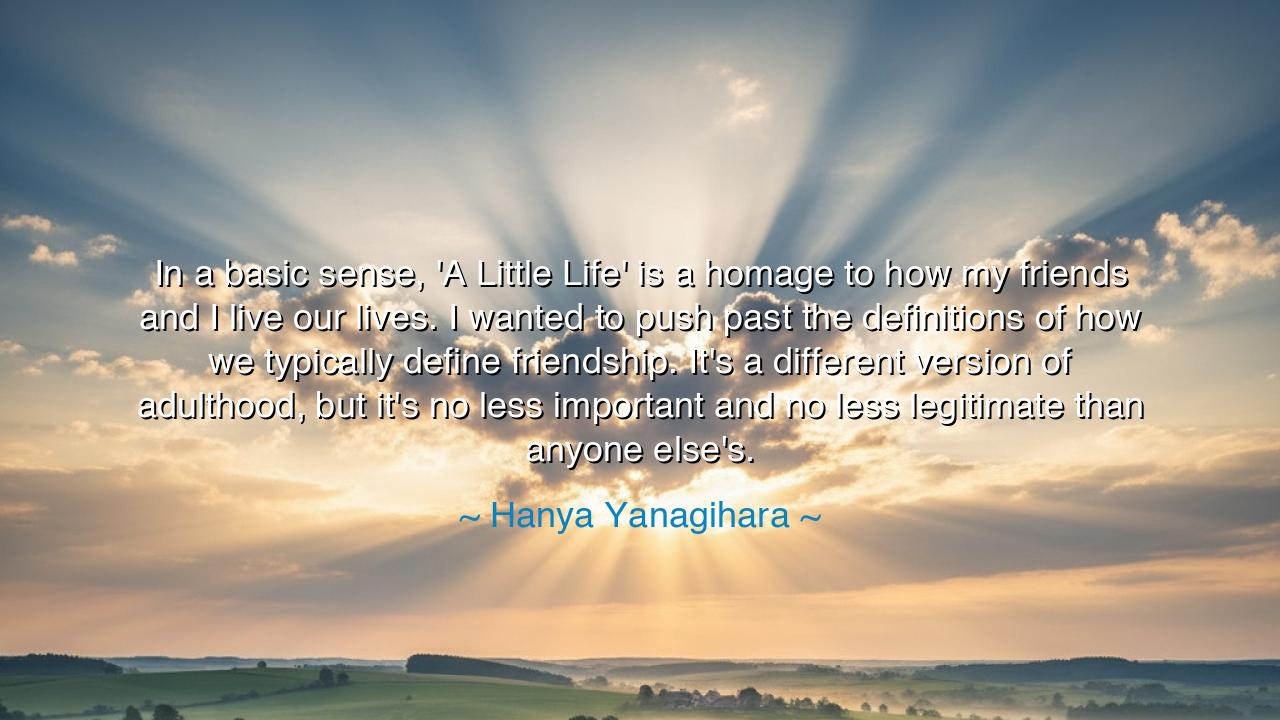
In a basic sense, 'A Little Life' is a homage to how my friends
In a basic sense, 'A Little Life' is a homage to how my friends and I live our lives. I wanted to push past the definitions of how we typically define friendship. It's a different version of adulthood, but it's no less important and no less legitimate than anyone else's.






In the luminous and soul-baring words of Hanya Yanagihara, the author whose pen plumbs the depths of human emotion, there resounds a profound reflection on the nature of companionship and existence: “In a basic sense, ‘A Little Life’ is a homage to how my friends and I live our lives. I wanted to push past the definitions of how we typically define friendship. It’s a different version of adulthood, but it’s no less important and no less legitimate than anyone else’s.” These words are both declaration and revelation — a challenge to the narrow measures by which society defines love, maturity, and connection. Yanagihara’s vision is one of friendship as a sacred bond, a force as vital as romance, as transformative as family, and as enduring as the human soul itself.
The origin of this quote lies in the creation of Yanagihara’s acclaimed novel, A Little Life, a work that shook readers to their very core with its exploration of pain, devotion, and survival. The novel follows four men — Jude, Willem, JB, and Malcolm — whose lives intertwine through decades of triumph and torment. But beneath the surface of suffering, the story is, as she herself explains, a homage to friendship. Yanagihara wrote from a place of personal truth, inspired by her own circle of friends and their shared life beyond the traditional milestones of adulthood. In an age obsessed with marriage, children, and career, she sought to celebrate another kind of adulthood — one rooted in chosen families, in emotional loyalty, and in the quiet heroism of standing by those we love.
To “push past the definitions of friendship,” as she says, is to recognize that love takes many forms, and that not all of them must conform to the patterns the world exalts. There are friendships deeper than blood, more enduring than passion, more constant than any vow. The ancients knew this. The philosophers of Greece — Aristotle, Cicero, and Epicurus — wrote of philia, the love of friendship, as one of life’s highest virtues, a harmony of souls joined in mutual goodness. Yanagihara, in her modern way, restores this ancient wisdom to a world that has forgotten it. She reminds us that the bonds between friends are not lesser versions of family or romance — they are, in their own right, the architecture of meaning that sustains us through the storms of life.
Consider the story of David and Jonathan in the ancient scriptures — a tale that stands as one of the earliest testaments to the holiness of friendship. David, the shepherd destined to be king, and Jonathan, the son of the king he would one day replace, loved one another “as their own souls.” Their friendship defied politics, bloodlines, and destiny. In a world ruled by power and lineage, their bond was pure — chosen, not inherited. It was a “different version of adulthood,” as Yanagihara would say, but no less important or legitimate. And when Jonathan died, David’s lament — “Thy love to me was wonderful, passing the love of women” — spoke not of scandal, but of the sacred truth that friendship, too, can be divine.
In Yanagihara’s world, as in David’s, friendship becomes both shield and sanctuary. It is what allows broken souls to endure, what turns pain into tenderness and loneliness into belonging. In a society that often equates adulthood with independence and isolation, she dares to suggest that adulthood can instead be communal — that to rely on others is not weakness, but wisdom. True maturity, she implies, is not measured by self-sufficiency, but by the courage to love without possession and to care without reward. The friendship she honors is one of constancy, loyalty, and unconditional presence — a devotion that does not ask, “What do I gain?” but rather, “How can I stand beside you?”
Her words also carry quiet rebellion. In a world that measures worth by traditional markers — marriage, family, property — Yanagihara defends the legitimacy of other ways of living. Those who build lives around friendship, creativity, or chosen families are not lesser; they are simply walking a different but equally sacred path. The “different version of adulthood” she describes is one where love is not confined to institutions, but flows freely, shaped by empathy and choice. It is an adulthood rooted not in convention, but in authenticity — one that values human connection over conformity.
And so, dear listener, take this teaching to heart. Do not let the world tell you that your friendships are secondary to romantic or familial bonds. Honor your friends as the pillars of your existence. Invest in them as you would in your own soul. Share your laughter, your sorrow, your dreams, and your silence. In a time when loneliness has become a modern plague, friendship is the medicine of the heart. Cultivate it as an art, protect it as a treasure, and treat it with reverence.
For in the end, Hanya Yanagihara’s wisdom reminds us that friendship is not merely an ornament to life — it is life itself. It is how we find meaning beyond the roles we are given, how we create family where none existed, how we endure the unbearable and rejoice in the simple. It is, as she says, no less important and no less legitimate than any other form of love. To live by this truth is to live abundantly — to know that even a “little life” built upon friendship is, in the eyes of the wise, infinitely great.






AAdministratorAdministrator
Welcome, honored guests. Please leave a comment, we will respond soon